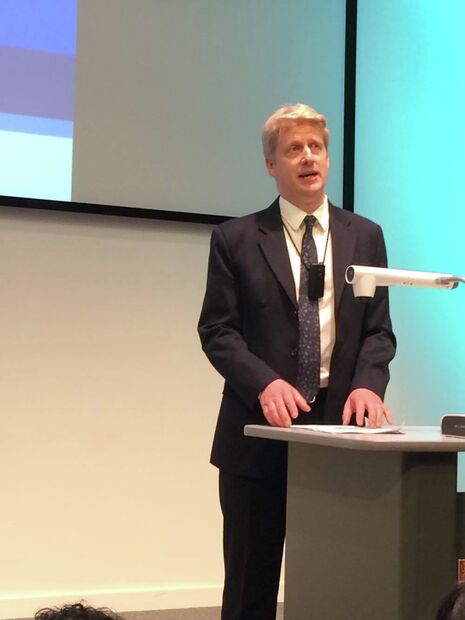Jo Johnson: ‘A vote to leave would be a leap in the dark’
The Minister for Universities and Science emphasised the negative effects of Brexit on science funding in a public lecture on Thursday

“If anyone wants to know whether the UK should leave the EU, they should speak to Boris.”
The assorted media – BBC, ITV, The Independent and (of course) Varsity – grabbed their pens excitedly. Jo Johnson MP, the Minister for Science and Universities and a vocal ‘in’ campaigner looked destined to provide a long-awaited public reaction to the announcement of his older brother, Boris Johnson, that he would be campaigning for Brexit. This came during a public lecture in Cambridge yesterday, where Johnson appeared alongside the European Commissioner for Science, Research and Innovation, Carlos Moedas.
But Johnson smiled knowingly, pointing instead at Professor Sir Leszek ‘Boris’ Borysiewicz, the vice-chancellor of Cambridge University, and launched into a cogent case against Brexit from the perspective of the scientific and research community.
At first sight, it seems unlikely that the general public’s concerns about the economy, immigration or the EU’s democratic legitimacy will be trumped by such an avenue of argument, but Johnson still describes it as “compelling and strong.”
Why? Because, according to Johnson, it is a prime example of a problem with the pro-Brexit argument, with “those who want to leave needing to explain how they will sustain the same levels of investment and the same depth of partnership if we were outside the EU. We have the best of both worlds... whilst non-EU countries can benefit, they forfeit a seat on the table when the European Parliament or other decision-makers decide the budget.”
Johnson backed up his argument with statistics showing that the UK is one of the largest net beneficiaries of EU research money: the total received by UK science between 2007 and 2013 was €7 billion. This figure, he argued, demonstrates that “the modern knowledge economy is built in collaboration and partnership. It depends on teams of researchers working together across borders. To thrive in the Information Economy, the UK needs to be open to the world, to be innovative, and to be building academic partnerships with its close neighbours, not turning its backs on them.”
Johnson was also keen to refer to recently published data showing that 9 out of 10 scientists agree EU membership benefits UK science and engineering. He stressed that “The facts matter. And few value evidence more than scientists.”
I drew the interview over towards the importance of Brexit for students, especially those studying STEM subjects. While polls show that the 18-24 age group is most likely to favour an ‘in’ vote, there are still those who remain unconvinced as to what the EU actually offers them. Johnson started to count on his fingers in a way that suggested that, as Minister for universities, he tackles this question often: “the terrific horizon-broadening Erasmus programme that enables students to travel around; future career opportunities for research and further study, given that science is increasingly international and cross-border in nature; and in career terms, we have no idea what effect Brexit might have on job opportunities and growth rates in our economy."
Johnson was also keen to talk about the importance of the science funding given by EU to Cambridge, both as a university and as a local area. Describing Cambridge as “a powerhouse of the British, European and indeed global knowledge economy, one the most powerful engines of Britain’s knowledge economy and a national asset of supreme performance,” he suggested that an ‘in’ vote would help sustain the momentum behind the Cambridge phenomenon and our national status as a global science superpower.
I enquired as to the use of this phrase, ‘The Cambridge phenomenon’, which he explained refers to the “Chinese-style growth rates of 7 per cent of year” seen recently in the region. Attributing them to “our close ties with the EU”, which he described as “a crucial part of this great national success story,” Johnson warned that Brexit would risk causing significant harm to the UK’s knowledge-based economy and the competitiveness of UK universities. “Our competitors in other countries will not hang around during a decade of uncertainty that might follow a vote for Brexit. They will seize the opportunity to win new investment and build new research links. A vote to leave would be a leap in the dark and one that would put the Cambridge Phenomenon and our status as a science superpower at risk.”
Whether or not you agree with his arguments, Johnson’s conviction is impressive. While his brother has come under fire for what’s been called a ‘careerist’ move in opting to back Brexit, this Johnson certainly seems to know where his heart lies.
 Comment / Plastic pubs: the problem with Cambridge alehouses 5 January 2026
Comment / Plastic pubs: the problem with Cambridge alehouses 5 January 2026 News / Cambridge businesses concerned infrastructure delays will hurt growth5 January 2026
News / Cambridge businesses concerned infrastructure delays will hurt growth5 January 2026 News / New movement ‘Cambridge is Chopped’ launched to fight against hate crime7 January 2026
News / New movement ‘Cambridge is Chopped’ launched to fight against hate crime7 January 2026 News / AstraZeneca sues for £32 million over faulty construction at Cambridge Campus31 December 2025
News / AstraZeneca sues for £32 million over faulty construction at Cambridge Campus31 December 2025 Interviews / You don’t need to peak at Cambridge, says Robin Harding31 December 2025
Interviews / You don’t need to peak at Cambridge, says Robin Harding31 December 2025










